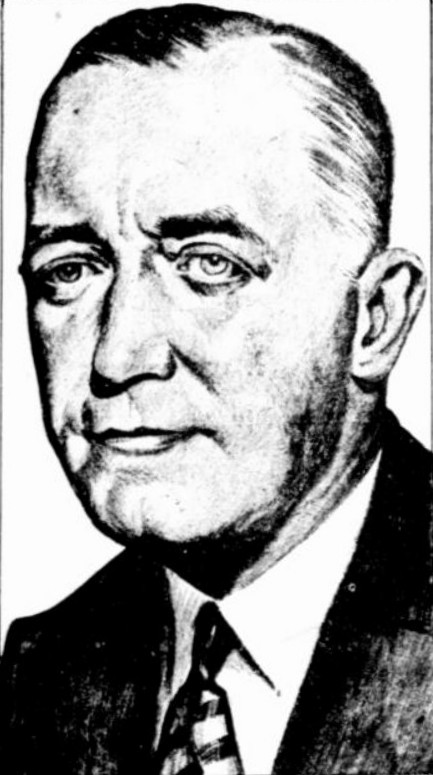The Pittsburgh Press (November 5, 1942)
Yankee Doodle Dandy ‘Over There’
George M. Cohan dies
Spent 54 years of life in theater
By Martin Kane, United Press staff writer

Cohan
New York –
George M. Cohan, the Yankee Doodle Dandy who wrote the best war song since “Dixie,” died today in the midst of a new world war for which “Over There” might mean any part of the globe.
He died at 5 a.m. in his 5th Avenue apartment, surrounded by his wife, his son, George Jr., and his daughter, Mary and Helen.
Cohan, who was 64, succumbed to an intestinal ailment which forced him to undergo an operation a year ago and from which he never fully recovered.
54 years in show world
The song and dance man – his own choice as the most fitting summation of his 54 years in the theater – was still enfeebled from the long, eventually fatal illness when Japan struck at Pearl Harbor. He wrote another war song. The tune was sprightly, with the old Cohan lilt, and the words rang true, but it was not the perfect wedding of lyrics and music which made “Over There” the marching song of a million Yanks.
On the eve of publication, it was decided to let the song rest on the shelf. That decision fulfilled his own intuition, expressed two years ago, when he said:
I hope America will never need another war song. But if we do need one, it will have to be written by some young fellow.
Star in every phase
George M. lived through the heyday of the American theater and was a star in every phase of popular entertainment.
He saw vaudeville reach its zenith and perish, and was one of its brightest marquee lights.
He gave musical comedy a star-spangled zest it has lacked since he left it.
He scored a triumph of legitimate acting in a Pulitzer Prize play written by the darling of the intelligentsia – Eugene O’Neill’s Ah, Wilderness!.
Kidded Roosevelt
In I’d Rather Be Right, he kidded President Roosevelt and won guffaws from the White House.
He scored a hit on the radio and acted in the movies, but he and Hollywood were divorced by mutual consent on grounds of incompatibility. He was more at home on Broadway.
He saw Broadway disappear into the side streets.
Any authorized biography of Cohan will record that he was born, in the words of one of his songs, “on the Fourth of July.” Old-time vaudevillians who trouped with his parents, Jeremiah and Helen Costigan Cohan, before Georgie was born, have been known to argue over a reminiscent beer that it wasn’t so, but even they dispute the time and place. If the records err, the mistake is understandable, for one-night stands have a disturbing effect on the space-time concepts of show business.
The official who’s-who version is the apt one, that he was born July 4, 1878, in Providence, Rhode Island. Before he joined his sister Josie in the Four Cohans at the age of 10, he sawed a fiddle in orchestra pits. For all the melodies he composed in later years, his formal musical knowledge never extended beyond a firm grasp on four chords in F-sharp. But he knew what people would whistle.
Known for kindliness
He was a skinny youngster who didn’t weigh 100 pounds until he was 27. He was also irascible when confronted by managers who did not appreciate his budding genius. If the Four Cohans got less than top billing, Georgie fumed and raged, threatening that “someday” he would buy the theater and throw the manager into the street.
Yet his essential kindliness was so much a part of the Broadway legend that the love which actors hold for him survived even the bitterness of the 1919 strike of the Actors’ Equity Association, when he denounced and fought the strikers. The actors wrote a special clause exempting him from the necessity of compromising his principles by joining Equity.
Critics later cheer him
He had many fights. Critics who sneered at his early flag-waving came to cheer it and be cheered by it. Its culmination was “Over There,” which, like many another Cohan song, was “just dashed off” on the inspiration of a moment.
A gold medal, authorized by a special act of Congress, was presented to him by President Roosevelt in 1940 in recognition of what that song had done to lift a nation’s morale.
Hollywood, with which he had fought the only draw of his career, eventually honored him with a film biography in Technicolor, something even Émile Zola didn’t rate. James Cagney played the lead in Yankee Doodle Dandy.
Cohan’s first wife was Ethel Levey, star of vaudeville and musical comedy in New York and London. After dissolution of the marriage, by which he had a daughter, Georgiana, he married Agnes Nolan, daughter of a Boston mail carrier, in June 1907. They had three children, Helen, Mary and George M. Jr.
Memory to live in song
A list of his successes as actor, songwriter, producer, manager, playwright would be interminable. Two plays, The Tavern and Seven Keys to Baldpate, at both of which the critics groaned, are still played in stock and amateur productions. There are scores of other comedies and musicals which knew his sure touch.
His partnership with Sam Harris resulted in Little Johnny Jones, Get-Rich-Quick-Wallingford, It Pays to Advertise and many other still-remembered hits which George M. wrote or rewrote.
But the memory of such productions, and songs like “Mary,” will fade like old playbills. The recollection of a gay blue eye, a derby’s tilt and the way a cane was twirled will not survive another generation. What will remain will be a song which kept time with the quickened heartbeat of a nation at war.